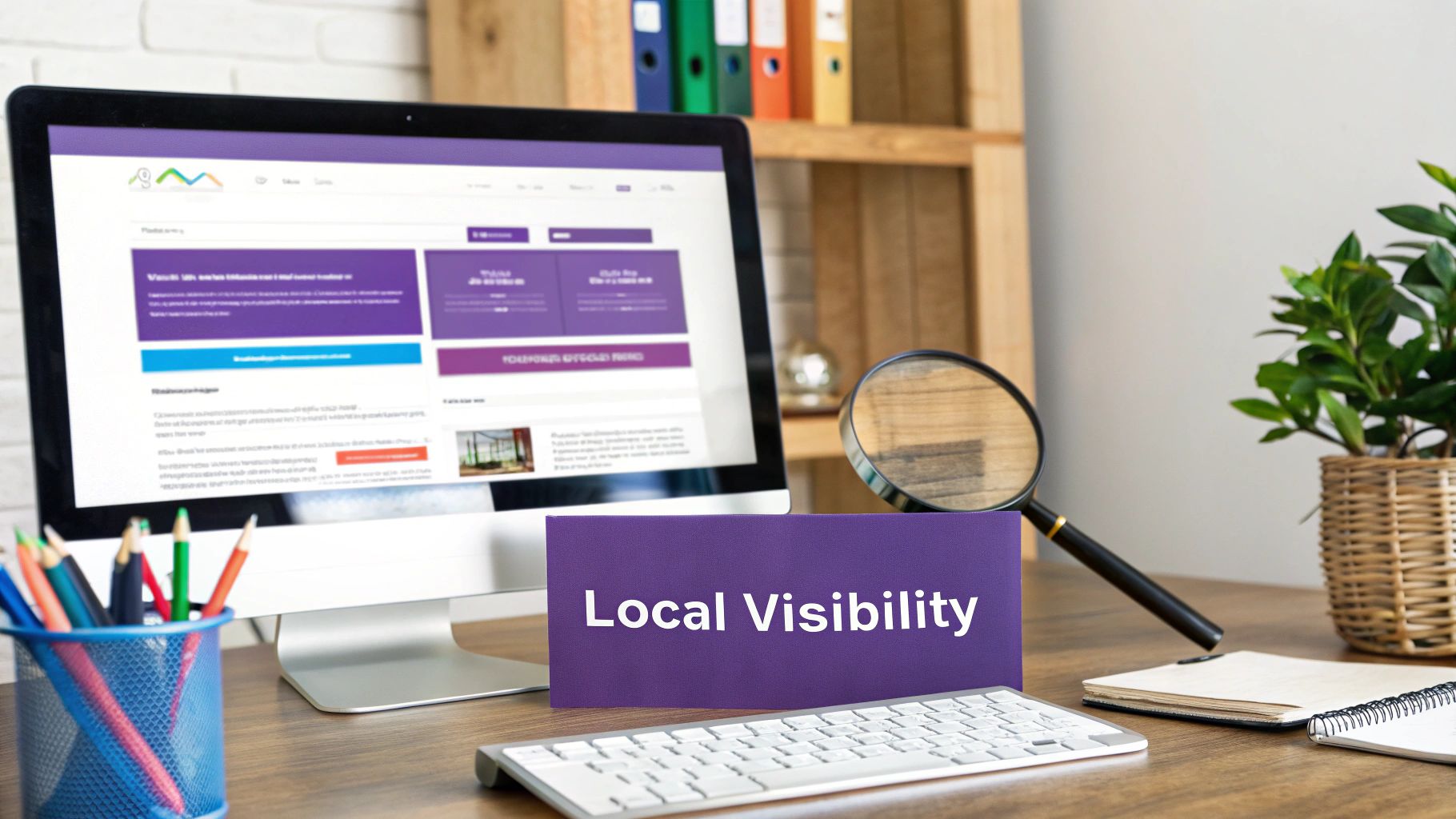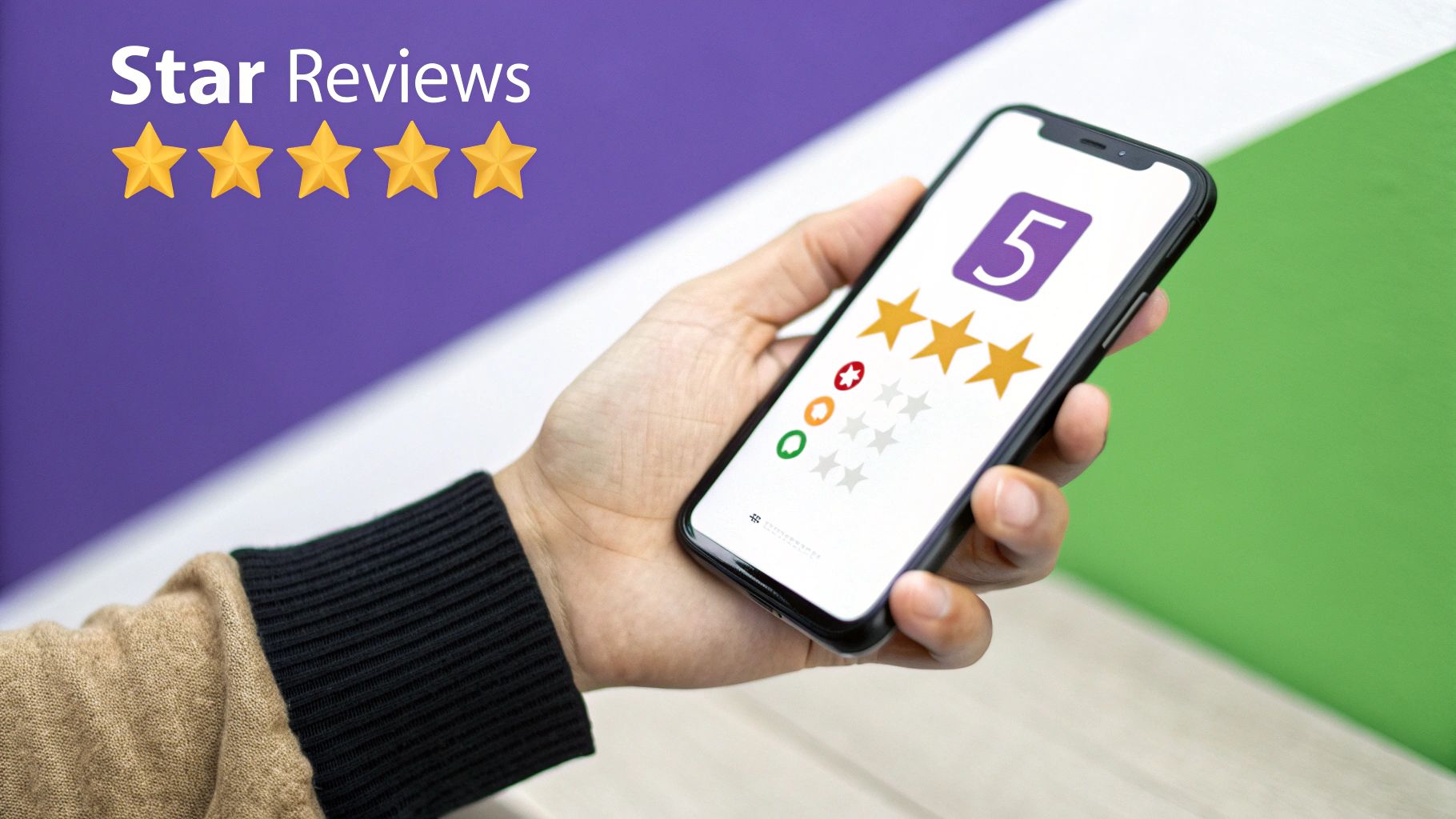9 Actionable Marketing Strategies for Law Firms in 2025
In today's crowded legal market, expertise alone isn't enough to guarantee a steady stream of clients. The most successful law firms are also sophisticated marketing machines, strategically attracting, engaging, and converting prospects into retained clients. The days of relying solely on traditional referrals are over; a multi-channel digital presence is now essential for growth and long-term viability.
However, navigating the complex world of digital marketing, with its unique ethical considerations and intense competition, can be daunting. Many firms invest significant time and resources into tactics that yield minimal results. This guide cuts through the noise.
We will break down nine powerful, actionable marketing strategies for law firms, providing a clear roadmap to help you build a more visible, authoritative, and profitable practice. From mastering Search Engine Optimization (SEO) and content creation to leveraging paid advertising and building robust referral networks, each strategy is a critical component of a comprehensive marketing system. This list is designed to deliver measurable results and help you secure a competitive edge.
1. Content Marketing & Legal Blogging
Content marketing is one of the most effective long-term marketing strategies for law firms. Instead of directly advertising your services, you create and share valuable online content, such as blog posts, articles, and guides, that answers the specific legal questions your potential clients are searching for. This approach positions your firm as a trusted authority and builds credibility before a potential client even picks up the phone.

This strategy works by attracting organic traffic from search engines like Google. When someone searches "what are the first steps after a car accident in Texas," a well-written blog post from a Texas personal injury firm can appear at the top of the results, providing immediate value and introducing the firm as a helpful resource. Firms like Morgan & Morgan have built extensive resource libraries covering thousands of legal topics, establishing themselves as go-to sources for legal information.
How to Implement This Strategy
- Identify Client Questions: Brainstorm common questions you receive during initial consultations. Use keyword research tools like Ahrefs or SEMrush to find what your target audience is searching for online.
- Write with Clarity: Avoid dense legal jargon. Write for a non-lawyer audience, explaining complex topics in simple, understandable terms. Your goal is to educate, not to write a legal brief.
- Include a Call-to-Action (CTA): Every piece of content should guide the reader on what to do next. Include clear CTAs like "Contact us for a free case evaluation" or "Download our free guide to the divorce process."
- Promote and Repurpose: Share your blog posts on social media, in email newsletters, and on platforms like LinkedIn. Repurpose a successful article into a video, an infographic, or a series of social media posts to maximize its reach. To dive deeper into crafting a robust content plan, consider reviewing a comprehensive guide on building a content marketing strategy.
2. Search Engine Optimization (SEO) for Legal Services
Search Engine Optimization (SEO) is the non-negotiable foundation for any law firm aiming to be found online. It involves optimizing your firm's website and digital presence to rank higher in search engine results for queries your potential clients are using. As most people now start their search for legal help on Google, appearing on the first page is not just an advantage; it's essential for a steady stream of high-quality leads. This is one of the most powerful marketing strategies for law firms because it attracts clients actively seeking your expertise.

This strategy works by signaling to search engines that your firm is a relevant and authoritative answer to a user's query. When someone searches "personal injury lawyer in Houston," effective local SEO helps a Houston-based firm appear in the top results and on the local map pack. Legal directories like Justia and FindLaw also leverage SEO to help smaller firms gain visibility, while large firms like Cooley LLP rank for competitive national terms related to corporate law by establishing deep topical authority.
How to Implement This Strategy
- Master Local SEO: Claim and completely optimize your Google Business Profile. Add high-quality photos, encourage client reviews, and use the Q&A feature. This is critical for appearing in "near me" searches.
- Build Relevant Citations: Get your firm listed in key legal directories like Avvo, Martindale-Hubbell, and FindLaw. Ensure your firm's name, address, and phone number (NAP) are consistent across all listings.
- Create Location-Specific Pages: If you serve multiple cities or regions, build dedicated pages for each one. Tailor the content to that specific location, mentioning local landmarks and legal nuances to improve local relevance.
- Focus on High-Intent Keywords: Instead of broad terms like "lawyer," target long-tail keywords that signal intent, such as "how to file for uncontested divorce in California." These queries attract clients who are closer to making a decision. For a deeper look into the nuances of this approach, you can explore more about SEO for professional services firms.
3. Pay-Per-Click (PPC) Advertising - Google Ads & LSAs
Pay-Per-Click (PPC) advertising offers law firms a way to gain immediate visibility at the top of search engine results. Unlike organic SEO, which can take months to yield results, PPC campaigns on platforms like Google Ads place your firm in front of potential clients the moment they search for legal help. You bid on specific keywords (e.g., "criminal defense attorney near me") and pay only when a user clicks on your ad, making it a highly targeted and direct approach.

This strategy is particularly effective for high-intent searches where individuals need immediate legal assistance. A family law firm, for instance, can run targeted ads for "emergency child custody lawyer" to capture urgent leads. A significant advantage for lawyers is Google's Local Service Ads (LSAs), which display a "Google Guaranteed" badge, providing an extra layer of trust and placing your firm above traditional PPC ads and organic results.
How to Implement This Strategy
- Prioritize Local Service Ads (LSAs): If your firm is eligible, start with LSAs. The "Google Guaranteed" badge builds instant credibility, and you typically pay per lead rather than per click, often resulting in a better return on investment.
- Create Highly-Targeted Campaigns: Structure your Google Ads account with separate campaigns for each practice area (e.g., DUI, divorce, bankruptcy). This allows you to control budgets and tailor ad copy specifically to the services offered.
- Utilize Negative Keywords: Actively build a list of negative keywords to prevent your ads from showing for irrelevant searches. For example, a personal injury lawyer would add "pro bono" and "free" to exclude users not seeking to hire an attorney.
- Track Everything: Implement conversion tracking for both phone calls and form submissions. This data is essential for identifying which keywords and ads are driving actual client inquiries, allowing you to optimize your spending for maximum impact. For a deeper dive into campaign setup, explore this guide on Google Ads for law firms.
4. Client Review and Reputation Management
In today's digital landscape, your law firm's online reputation is its most valuable asset. Reputation management involves systematically collecting, monitoring, and responding to client reviews on platforms like Google, Avvo, and Yelp. Since the vast majority of potential clients research attorneys online before making contact, a strong profile filled with positive reviews acts as powerful social proof, directly influencing hiring decisions and building trust.

This strategy is one of the most critical marketing strategies for law firms because it significantly impacts local search rankings and client acquisition. A high volume of recent, positive reviews signals to search engines that your firm is credible and relevant. For example, national firms like Morgan & Morgan leverage tens of thousands of reviews to dominate local search results, while boutique firms can differentiate themselves in competitive markets by accumulating over 100 five-star Google reviews.
How to Implement This Strategy
- Systematize Review Requests: Don't leave reviews to chance. Implement a consistent process to request feedback from satisfied clients around 30 to 60 days after their case concludes.
- Make It Easy: Remove friction by sending clients a direct link to your Google Business Profile review page or your Avvo profile. The fewer clicks required, the higher the completion rate.
- Respond to All Reviews: Professionally and promptly respond to every review, both positive and negative, ideally within 24-48 hours. Thank positive reviewers and address negative feedback constructively while maintaining strict client confidentiality.
- Showcase Your Best Reviews: Feature your top testimonials and star ratings prominently on your website's homepage and key practice area pages. This reinforces your credibility at critical decision-making points for potential clients. You can use tools like Birdeye to streamline this process.
5. Social Media Marketing and Engagement
Social media marketing for law firms involves more than just posting occasional updates. It's about building an authentic presence on platforms like LinkedIn, Facebook, and even TikTok to humanize your firm, share valuable insights, and foster relationships with potential clients and referral partners. This strategy excels at building brand awareness and credibility, positioning your firm as approachable and knowledgeable.
While direct client acquisition through social media can be challenging for some practice areas, its power lies in top-of-mind awareness and trust-building. Criminal defense attorney Ugo Lord, for example, has gained millions of TikTok followers by creating short, educational videos that answer common legal questions. This approach builds a massive audience and establishes him as a go-to authority, which can lead to consultations, media opportunities, and referrals. For B2B firms, LinkedIn remains a powerful tool for connecting with corporate decision-makers through thought leadership content.
How to Implement This Strategy
- Choose Platforms Wisely: Don't try to be everywhere. Focus on one or two platforms where your ideal clients spend their time. LinkedIn is essential for corporate and B2B law, while Facebook may be better for B2C practices like family law or estate planning.
- Prioritize Educational Video: Video content consistently outperforms static images and text. Create short-form videos (Reels, Shorts, TikToks) that answer a single legal question, explain a complex concept simply, or share a client success story (with permission).
- Engage Authentically: Social media is a two-way conversation. Respond to comments, answer questions, and participate in relevant discussions. This engagement builds a loyal community around your brand.
- Post with Consistency: Create a content calendar and aim to post at least 3-5 times per week. Consistency is more important than frequency. A steady stream of valuable content keeps your firm visible and relevant to your audience.
6. Referral Network Development and Attorney-to-Attorney Marketing
Referral network marketing is a powerful, relationship-driven strategy focused on generating cases from other professionals. Instead of marketing directly to potential clients, you build a trusted network of other attorneys and complementary professionals who send qualified business your way. This approach is highly effective because it relies on the credibility and endorsement of a trusted source, leading to high-quality, pre-vetted leads.
This strategy capitalizes on legal specialization. A family law attorney, for instance, may not handle a client’s subsequent need for an estate plan, creating a perfect referral opportunity for a trusted colleague. Similarly, an estate planning lawyer can form a strategic partnership with a financial advisor to provide holistic client service. These mutually beneficial relationships create a sustainable pipeline of ideal cases that traditional advertising often cannot replicate.
How to Implement This Strategy
- Be a Giver First: Focus on providing value to your network before asking for anything in return. Refer cases out, share helpful resources, and make introductions. Your generosity will be remembered and reciprocated.
- Target Complementary Professionals: Identify non-competing professionals who serve your ideal client. For a personal injury firm, this includes chiropractors and physical therapists. For a business law firm, this includes accountants and business bankers.
- Systematize Your Process: Create a clear process for accepting and tracking referrals. Acknowledge every referral received with a prompt thank you, and keep the referring party updated on the case status (while respecting client confidentiality).
- Join and Participate: Actively engage in local and state bar association committees. These are excellent venues for building genuine relationships with other attorneys who will eventually become valuable referral sources. To explore how formalized networking groups operate, consider looking into organizations like Business Network International (BNI), which has perfected this model across industries.
7. Email Marketing and Newsletter Campaigns
Email marketing is a powerful, direct line of communication for law firms to nurture relationships with past clients, current leads, and professional contacts. Instead of waiting for potential clients to find you, this strategy allows you to deliver valuable content directly to their inboxes, keeping your firm top-of-mind and reinforcing your authority. It's an owned media channel, meaning you control the list and the message, making it a stable asset in your marketing toolkit.
This strategy works by building trust over time. For example, an estate planning firm can send quarterly newsletters to past clients about changes in inheritance tax laws, prompting them to update their wills. Similarly, an employment law firm can send compliance alerts to a segmented list of HR directors, positioning themselves as an indispensable resource. This consistent, value-driven contact generates repeat business and referrals far more effectively than one-off advertisements.
How to Implement This Strategy
- Build Your List Ethically: Offer a valuable incentive, or "lead magnet," like a free guide, checklist, or webinar recording in exchange for an email address. Never buy email lists; focus on building a list of genuinely interested contacts.
- Segment Your Audience: Group your contacts based on their relationship to your firm (e.g., past clients, leads, referral partners) and their legal interests. This allows you to send highly relevant content instead of generic blasts.
- Provide Genuine Value: Your emails should prioritize useful information, such as legal updates, strategic advice, and answers to common questions. Keep self-promotion subtle and secondary to the value you provide.
- Craft Compelling Subject Lines: Your subject line is crucial for getting your email opened. Make it clear, specific, and focused on the benefit to the reader. A/B test different options to see what resonates with your audience.
- Maintain a Consistent Schedule: Whether it's monthly, bi-monthly, or quarterly, consistency is key. A regular newsletter builds anticipation and keeps your firm from being forgotten. Tools like Mailchimp or Constant Contact can automate this process.
8. Video Marketing and YouTube Channel Development
Video marketing is a powerful strategy for law firms to connect with potential clients on a more personal level. Instead of just reading about your services, prospective clients can see and hear you, which builds trust and rapport far more effectively than text alone. This involves creating educational videos that answer common legal questions, explain complex processes, or share client testimonials, primarily for platforms like YouTube, your website, and social media.
This strategy works because video content is highly engaging and easily digestible. A potential client is often more likely to watch a 3-minute video explaining the "basics of filing for divorce" than to read a lengthy article on the same topic. Channels like LegalEagle have shown how complex legal topics can be made accessible and entertaining, building a massive audience. Similarly, family law firm Cordell & Cordell uses an extensive video library to guide clients through the divorce process, establishing authority and generating qualified leads.
How to Implement This Strategy
- Start with FAQs: Your best video topics are the questions you answer every day. Create short videos addressing the most common questions you receive during initial consultations.
- Prioritize Audio Quality: Viewers will forgive mediocre video quality, but poor audio will cause them to click away immediately. Invest in a decent external microphone for clear, professional sound.
- Optimize for Search: Use descriptive, keyword-rich titles and descriptions on your YouTube videos. This helps them appear in both YouTube and Google search results, making it one of the most effective marketing strategies for law firms seeking organic visibility.
- Be Authentic and Personable: Don't strive for a flawless Hollywood production. Authenticity is more important for building connection. Let your personality show and speak directly to your ideal client's concerns. Include a clear call-to-action in every video, telling viewers exactly what to do next, like "Call us today for a free consultation."
9. Niche Specialization and Positioning Strategy
Instead of marketing as a general practice firm, niche specialization involves positioning your practice as the definitive expert in a specific legal area, client demographic, or industry. This approach makes your marketing efforts more effective by creating clear differentiation, reducing competition, and allowing for highly targeted messaging that resonates deeply with a specific audience. It's built on the principle that being known as the best at one thing is more valuable than being average at many.
This strategy works because it attracts higher-quality, pre-qualified leads. For example, a firm like Cordell & Cordell, which focuses exclusively on men's divorce and family law, attracts clients who feel the firm uniquely understands their specific challenges. Similarly, a firm specializing in workers' compensation defense for California businesses can tailor all its marketing to address the precise pain points of HR managers and business owners in that state, making it the obvious choice over a general litigation firm.
How to Implement This Strategy
- Identify a Viable Niche: Choose a practice area you enjoy that has sufficient market demand to be profitable. Before tailoring your marketing efforts, it's essential to understand how to create buyer personas to define your ideal client within that niche.
- Dominate Niche-Specific Content: Create blog posts, guides, and videos that answer every conceivable question for your target audience. If you serve craft breweries, write about TTB label approvals or distribution agreements.
- Engage with the Niche Community: Join and become active in industry associations relevant to your niche. Speak at their conferences, write for their trade publications, and build a reputation as the go-to legal expert.
- Build a Referral Network: Develop strong relationships with attorneys in broader practice areas who can refer specialized cases to you. To further refine your messaging, explore effective brand positioning statement examples that can clarify your unique value.
9 Marketing Strategies Comparison for Law Firms
| Content Marketing & Legal Blogging | Medium to High - consistent content creation needed | Medium to High - requires expertise & time | Builds authority, improves SEO, long-term client attraction | Firms aiming for thought leadership and SEO growth | Establishes credibility, cost-effective, evergreen content |
|---|---|---|---|---|---|
| Search Engine Optimization (SEO) for Legal Services | High - technical skills and ongoing maintenance required | High - in-house or agency investment | Highly targeted organic traffic, strong local visibility | Firms wanting sustained online presence and leads | Long-term client acquisition, local market dominance |
| Pay-Per-Click (PPC) Advertising - Google Ads & LSAs | High - requires expert management and optimization | Very High - significant monthly budget | Immediate visibility and lead generation with measurable ROI | Firms needing quick leads and instant presence | Fast results, precise targeting, outranks organic results |
| Client Review and Reputation Management | Low to Medium - systematic monitoring and responses | Low to Medium - software and time investment | Improved local SEO, increased trust, higher conversion rates | Firms focusing on local market and trust building | Boosts social proof, lowers acquisition costs |
| Social Media Marketing and Engagement | Medium - consistent posting and engagement required | Low to Medium - time or moderate budget | Builds brand awareness and trust, engagement with younger demographics | Consumer-facing and B2B networking | Humanizes firm, low cost, viral potential |
| Referral Network Development | Medium - relationship and networking intensive | Low to Medium - mainly time and event costs | High-quality leads with better conversions and sustainable referrals | Firms leveraging attorney and professional referrals | High conversion, lower cost per acquisition, builds trust |
| Email Marketing and Newsletter Campaigns | Medium - ongoing content creation and list management | Low - platform fees and content creation time | Maintains relationships, nurtures leads, measurable ROI | Firms needing repeat business and client retention | Owned channel, low cost, high ROI |
| Video Marketing and YouTube Channel Development | Medium to High - content production and presentation skills | Low to High - from smartphone to professional video costs | Strong engagement, builds trust, improves SEO and conversions | Firms explaining complex topics and personal branding | High engagement, multi-platform repurposing |
| Niche Specialization and Positioning Strategy | Medium - strategic focus and market research needed | Low to Medium - mainly strategic commitment | Reduced competition, premium pricing, highly qualified leads | Firms wanting clear differentiation and targeted messaging | Higher conversion, premium fees, clear expertise positioning |
From Strategy to Success: Your Next Move
Navigating the landscape of legal marketing can feel complex, but the path to a thriving practice is built on a foundation of deliberate, strategic action. We have explored a comprehensive suite of powerful marketing strategies for law firms, from establishing authority through in-depth content and targeted SEO, to capturing immediate demand with sophisticated PPC and Local Service Ads. Each strategy, whether it's managing your online reputation, building a robust referral network, or engaging clients through video, offers a unique lever to pull for sustainable growth.
The true power, however, lies not in choosing one tactic but in creating an integrated marketing ecosystem. Your niche specialization should be the bedrock that informs every decision. It defines the keywords you target in your SEO efforts, the topics you cover in your blog and videos, and the audience you engage on social media. A stellar reputation amplifies the effectiveness of your paid ads, while a compelling email newsletter keeps your firm top-of-mind, nurturing leads and encouraging referrals.
Your Blueprint for Action
The sheer number of options can be overwhelming, but progress begins with focus. Instead of attempting to implement all nine strategies at once, commit to a more manageable and effective approach.
- Audit and Prioritize: Begin by assessing your current marketing efforts and firm-wide goals. Are you seeking a higher volume of cases immediately, or are you focused on long-term brand building in a specific practice area? Your answer will guide your initial focus. For instance, a firm needing quick leads might prioritize Google Ads and reputation management, while a firm aiming for thought leadership would double down on content marketing and SEO.
- Master and Measure: Select one or two strategies that align with your immediate priorities and dedicate your resources to executing them exceptionally well. Set clear, measurable key performance indicators (KPIs) to track your progress. This could be organic traffic growth for SEO, conversion rates for PPC campaigns, or open rates for your email newsletter.
- Expand and Integrate: Once you have established a successful and repeatable process in your initial focus areas, you can begin layering in complementary strategies. Use the insights gained from your first campaigns to inform your next moves, creating a synergistic system where each component strengthens the others.
Ultimately, the most successful marketing strategies for law firms are those that are implemented with consistency, precision, and a deep understanding of your ideal client. This commitment transforms marketing from a cost center into a predictable, revenue-generating engine for your practice. It is the critical investment that separates firms that merely exist from those that dominate their market.
Executing these complex digital strategies effectively can be a full-time commitment. For firms ready to accelerate growth without the steep learning curve, partnering with a specialized legal marketing agency like Rebus is a game-changer. We bring the expertise to build and manage a predictable pipeline of high-value cases for your firm.

